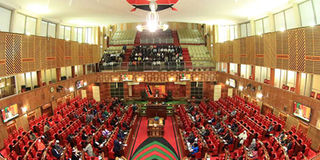MPs vote on two-thirds gender bill

Member of Parliament debate the two-thirds gender bill on the floor of the house on November 21, 2018. The bill, which is sponsored by Majority Leader Aden Duale, seeks to ensure that the two houses comply with constitutional requirements on representation. FILE PHOTO |
What you need to know:
- The Constitution states that no gender shall be more than two-thirds both in elective and appointive positions in public service.
- The National Assembly has 76 women legislators out of 349 MPs, representing 21.77 per cent of total members.
- At least 39 more female legislators are required to meet the constitutional threshold.
Kenyans are watching keenly as members of the National Assembly, for the fourth time, vote on the enactment of the Constitution of Kenya (Amendment) Bill 2018, which seeks to implement the two-thirds gender rule on representation in parliament.
The enactment of the gender bill has failed three times.
In the last session, the bill did not see the light of the day after it was withdrawn by Leader of Majority Aden Duale due to lack of quorum to send it to the third reading stage.
SUPPORT
The MPs failed to turn up despite President Uhuru Kenyatta and opposition leader Raila Odinga passionately appealing to their respective party members to back the bill.
A total of 137 of the 349 MPs kept away from the House, dealing a technical hitch to the legislation that is aimed at increase the number of women MPs in both the National Assembly and the Senate.
At least two-thirds majority or 233 of the 349 MPs in the National Assembly are required to be present in the House before the question is tabled.
The Kenya Women Parliamentary Association (Kewopa) has been lobbying male legislators to support the bill.
In 2017, an attempt by then Nominated Senator Judith Sijeny to have the bill passed through the Senate failed because of lack of numbers.
She failed to get the numbers to move the bill to the next stage as only 23 out of the 67 members were present during the vote yet at least 45 senators are required to support the legislation.
The bill that was sponsored by then Justice and Legal Affairs Committee Chairman Samuel Chepkonga suffered the same fate in November 2016.
FIRST ATTEMPT
The first attempt to have the bill sail through flopped after garnering 178 votes.
The Constitution states that no gender shall be more than two-thirds both in elective and appointive positions in public service.
The National Assembly has 76 women legislators out of 349 MPs, representing 21.77 per cent of total members. At least 39 more female legislators are required to meet the constitutional threshold.
The Senate, with 21 women members out of 67 (14 percent), is three members shy of the constitutional requirement of at least 30 per cent.
Should the MPs fail to pass the bill, the House could find itself in a tight spot as anyone can petition the High Court to have it dissolved by the President on the advice of the Chief Justice.
ADVICE
The Constitution has not outlined mechanisms that will realise this principle. In 2012, the The Attorney-General filed an application at the Supreme Court seeking an advisory opinion on how to implement the principle.
The Supreme Court ruled that there were no concrete provisions to realise gender balance. The court also gave a timeline of August 27, 2015 to have mechanisms that will actualise the two-thirds gender principle. Parliament, however, requested for an extension of the deadline by a year which lapsed in 2016.
In September 2016, two non-governmental organisations, Centre for Rights Education and Awareness and Community Advocacy and Awareness Trust filed a petition at the High Court seeking a declaration that the failure by Parliament to enact the legislation within the set timeline by the Supreme Court advisory opinion and the Constitution was a violation of the law.
High Court Judge John Mativo ruled in their favour.
The 12th Parliament now risks dissolution for breach of the Constitution.





